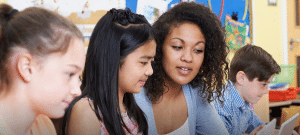Personalized Learning Worth Fighting For
CompetencyWorks Blog
 This post originally appeared at Getting Smart on February 28, 2017. It is the third in a three-part series on “Readiness for All.” Read the first post here and the second post here.
This post originally appeared at Getting Smart on February 28, 2017. It is the third in a three-part series on “Readiness for All.” Read the first post here and the second post here.
The goal of college and career readiness for all has been the focus of education reform initiatives and a unifying aspiration, yet attainment eludes us. We can continue to debate how readiness is defined and measured, but time has proven that the traditional, factory-style approach will not suffice. Personalized learning is the next logical step toward the “readiness for all” objective.
Personalized learning is when students are provided flexibility in an environment with simultaneously increased structure and support that aligns with their interests, strengths and skill level. We believe meeting students where they are and providing the individualized supports they need to grow is the desire of all educators, but significant flexibility and system change will be required to reach that vision.
The possibilities of a truly student-centered system seem endless, but the irony is that many coincide perfectly with policies special education advocates have long been fighting for.
- Inclusion. Historically, specialized instruction resulted in segregated settings. In a personalized setting, it is expected and understood that students will be learning in multiple ways and at flexible paces. When this goal is achieved system-wide, we may at long last be able to reduce the stigma associated with being a struggling learner.
- Self-advocacy and student agency. These terms and goals have been common lingo in special education for years, but the opportunity to not only recognize them but build them in system-wide for all students could increase the realization of these goals.
- Strengths-based approach. By definition, personalized learning is based on students’ strengths and interests, and with intentional design, the opportunity exists to finally move away from the deficit-based nature of individual education plans (IEPs). At bare minimum, a system that has truly embraced personalized learning has also embraced a growth mindset. This mindset should be able to permeate IEP meetings and bring about a more positive parent experience.
- Increased academic achievement. The entire premise of special education is to provide the services and supports students need to access and succeed in school. Ironically, this is the same for personalized learning. Perhaps the opportunity to redesign a system from scratch will lessen the need to see special education as a separate program for “those kids” and a real need for ALL kids.
Personalized learning has the potential to increase achievement not only through flexibility in pace and instruction but also in how students are able to demonstrate mastery. It has been a long understood principle of special education that students with special needs may require accommodations and/or modifications for assessments, but with personalized and competency-based education all students will be allowed to have voice and choice in how they demonstrate mastery. There is also an opportunity with the Every Student Succeeds Act’s requirement to embed the principles of universal design for learning in state assessments.
These goals and dreams may seem lofty, but they should not be optional. Early implementation evidence and beginning research give us hope, but at the end of the day honoring and leveraging the unique gifts and talents of every child is simply the right thing to do.
See also: